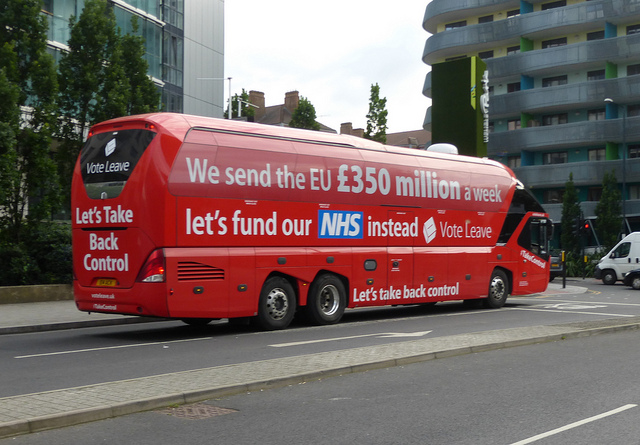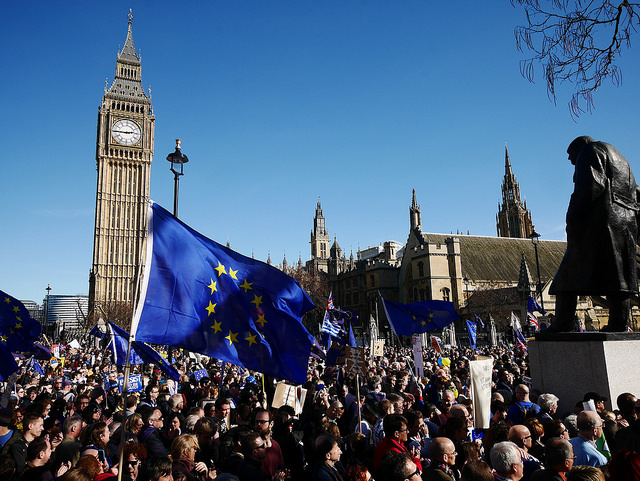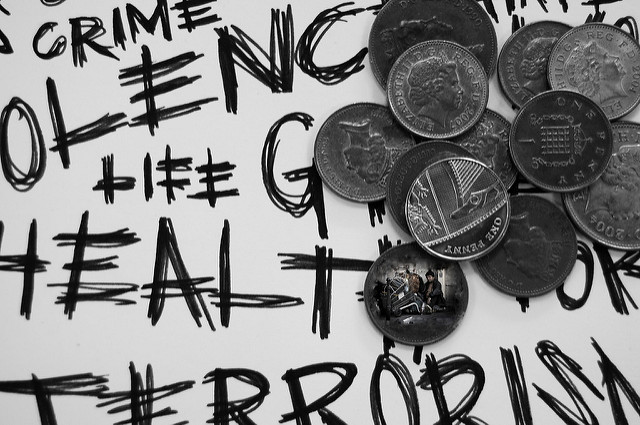We have now entered a new era in both political and public conversation, which has been dubbed as the ‘post truth’ age.
Ian Dunt, 35,Political correspondent and Author, said: “The term is new, I would suggest the quality of what we are seeing now compared to the past is completely different. We never lived in some kind of idealised soporific culture where everyone only dealt with what was true and there was never any emotions or any sort of sense of tribal identity. We’ve always had our heads turned by politicians that lie, media that lies and facile metaphors.”
Even though the term, post truth has been around for a while, it has recently peaked in 2016 by being used more in conversations. According to Casper Grathwohl, Oxford Dictionaries’ president, it was not surprising to have this term defined in 2016 as it was controlled by the high influence of social and political discourse. Its spike was witnessed first in June after the Brexit vote and later in July when Donald Trump was nominated as the Republican presidential candidate.
In this new era, public relations have been seen to preside over reality to the extent where it is not only overruled but made irrelevant. A good example of this was witnessed during the EU referendum. The leavers made many promises, among them less immigration and tax, fixing of economic injustices, as well as the control over border money. Some of these promises make no sense since real politics recognise the balancing and compromising of competing international as well as domestic interests. What is even more worrying is the fact that this post-truth politics is still being exercised after the campaigns.
The United Kingdom voted for a campaign that was grounded on lies, one being where a sum of £350 million would be spent on the National Health Service instead of being given to Brussels. The lie was then confirmed the next morning but never seemed to matter to the politicians, when it mattered to the general public, as this was one of the reasons a second referendum was called for. When the real facts were adduced, they were dismissed by Nigel Farage and other members of the leave party as propaganda from the mainstream media.
William Wragg, 21, student, said: “I remember Farage talking about the money going back into the NHS, he and the other members of the leave party had encouraged people to vote for what they cared about despite the facts being manipulated and turning out to be untrue.”
Councillor David Jones, 62, Deputy Portfolio owner for economic growth & regeneration at Wakefield Council, said: “I was involved in the remain campaign, I actively campaigned for them. I also ran a campaign on social media. One thing I remember the most was on one Saturday morning where I was threatened to be dragged to the Town Hall [in Wakefield] and be shot. They threatened to do this as I was classed, in their eyes, as a traitor to the Queen and our Country. It was probably one of the most confrontational campaigns that’s I have even been involved in.”
The public is becoming more susceptible to suggestions, emotions and misinformation from politicians. In the EU, notable examples include Boris Johnson and Nigel Farage in their campaigns on Brexit and Geert Wilder of Netherlands. This enormous growth of the post-truth politics has been facilitated by the Western citizens’ disillusionment with their policy makers, political institutions, and politicians. Social media platforms such as Twitter, Reddit, and Facebook are also being blamed for allowing people to publish information without control from the traditional media. These underlying algorithms facilitate the formation of echo chambers such that a single media feed gets dominated by few corresponding perspectives. The traditional media does not necessarily perform better, according to the study conducted by William Davies that was published in the New York Times, The Age of Post-Truth Politics, regarding the Brexit campaign, even these platforms can give misleading information.
Clare Sharp, 38, Relief Bar Stewardess, said: “I remember watching the news and reading about it in the newspapers, we got told that we shouldn’t pay the European membership anymore as it was costing us too much.”
David Preston, 55, Manager at Service Metals, said: “I followed both of the campaigns during Brexit. I remember that Boris Johnson and Nigel Farage got plenty of media coverage whereas there was not one individual that stuck out for the remain campaign.”
Both Boris Johnson and Nigel Farage have failed to make a comment regarding post truths in relation to Brexit. And other MPs of both the Labour and Conservative parties failed to comment.
It was reported by Oliver Tim, in an online article, LSE Brexit, that there are five principles of negotiation with the EU that need to be followed. The most important among them is the fourth principle, which states that we will trade freely in Europe’s single market. For one to be a member of the single market economy, he or she has to agree with the rules governing it as well as the freedom of movement. This is what qualifies it to be a free market since it has regulatory equivalence, freedom of capital, as well as labour. But then, demands one and two, of the five principles, contradict with the fourth as they state that British laws will trump Brussels edicts, and immigration will be on our terms. This is quite abnormal, especially on a policy level, because it I not even the beginning of negotiations. It is more shameful to know that the European leaders will sit down to discuss such a proposal and wonder if they have partners to negotiate such terms. This makes us look like a clown nation. It even makes it hard to know whether our decisions during the referendum were principled or misjudged simply because they were based on lies.
Ian King, 49, HGV Driver, said: “I think that nobody is able to accurately judge exactly what the outcome is going to be but I believe that we have to be strong in what we want and take it forward. We have to go where it goes.
There is no democracy within the EU, there is massive differences in wealth and statuses in ever country making it unequal and too varied.
I don’t think things will be as severe as people think. Our standing in the world is superior, with Germany as the exception. After the UK filling its Brexit dream, I don’t see a long term EU. Eventually others will leave.”

The Brexit campaign is still fresh in the majority of the British population minds due to the amount of scandals that came out after the votes were counted and confirmed.
Councillor Peter Box, 70, Leader of Wakefield Council, said: “The Brexit campaign was utterly appalling as both parties lied. For example when the Brexit campaign claimed they would spend £350 million on the NHS, it was lies. And then the remain campaign lied when they said we would need an emergency budget to stay in the EU.
I think it is the most dispiriting campaign that I’ve ever seen in my lifetime, as it was full of negativity and it took politics to a new level just reinforcing what people already think about politicians and how they do not trust them”
It is worth noting that facts are commonly used to explain political decisions. However, data can sometimes differ by their core measurements or formulas, and mostly, contradicting the truth may be present during political debates. Also, the benefits and costs associated with political decisions and policies depend on the future and cannot be visible unless they are implemented. With that, not even the proven estimates can be real. The viable truth depends on the evidence of political framing, cueing and priming more than its legitimacy. It is the duty of the policy makers and politicians to develop their communication approach. The evidences and facts in support of their arguments are insignificant if they lack a formulated plan to capture the public’s attention as well as credibly putting their message across.
Ian King, said: “Who is educated enough to know the figures – it’s such a big pot. How could they itemise what the UK pays to the EU and what money we get back from them.”
Ian Dunt, said: “It’s impossible to say [that Brexit was based on post-truths], there was parts of their campaign was true, but Nigel Farage wasn’t actually in charge of the £350 million price. They were lying quite a bit but usually in a within sphere of truth, they would say the £350 [million] was an aspiration. Although even the £350 [million] is technically true but misleading as it doesn’t include the rebate or any of the things we get back.
It was the same with the Turkish membership, some of that was just lies they basically said no one could stop them from joining. An actual fact we could, but the British government has been campaigning for Turkey to join the EU pretty much the entire time.”

According to Brexit supporter, Michael Gove a conservative politician, people have had enough of experts. His statement has some truth in it, as it has been seen in the United Kingdom with the Brexit vote as well and the election of Donald Trump as president. They are a representations of terrible disaster of public confidence in knowledge evidence, and expertise. They also present a painful challenge to the civil societies and universities.
Ben Ledgeway, 18, RAF aircraft maintenance mechanic, said: “People voted to leave the EU because they wanted a change. It has been the same old for over forty years in the EU. People were desperate from some change.”
Neil Clayton, 47, Board of Governors at Carlton Club, Normanton, said: “People wanted to try and take back control from those in charge and show that they also have a voice, and want to be heard as they no longer trust the elites.”
Even though quite a number of people voted out of the European Union for the reasons the leave party campaigned for others that have been through different times in comparison to the younger generation had different views.
Councillor Box, said: “I voted to leave the EU as I think the EU is no longer the organisation it used to be and I believe it is no longer the organisation it used to be and I think it isn’t fit for purpose.”
Humans feel comfortable when they identify an ideology with a religion, culture, mere conviction, and group. Such kind of tribalism contributed to many unpleasant themes that galvanized the Brexit vote. This encourages sneering at the deplorable leavers and anti-intellectuals and racists. We are all vulnerable to think that the ideas we hold so dear are principled and reasonable










